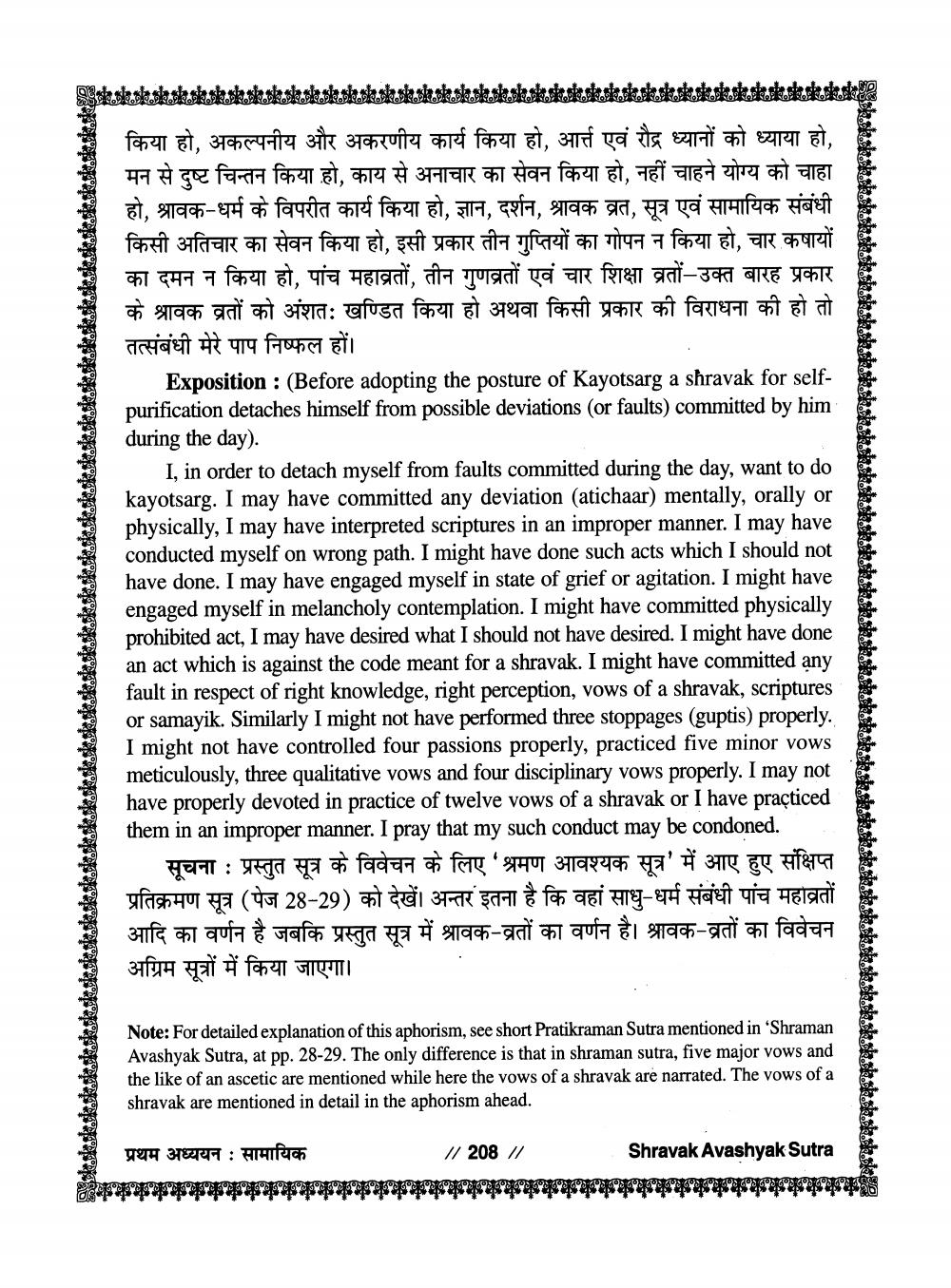________________
sssssslessleelesslese.slesakalee
doclesslesslesslesslesslesslesslesslelesslesslesslesslese.
s
pokestakesekasekskskskskskskelesksekcakeekakeskskskskskskskskskskskskskskskskskskskskskskskskrit
किया हो, अकल्पनीय और अकरणीय कार्य किया हो, आर्त एवं रौद्र ध्यानों को ध्याया हो, मन से दुष्ट चिन्तन किया हो, काय से अनाचार का सेवन किया हो, नहीं चाहने योग्य को चाहा हो, श्रावक-धर्म के विपरीत कार्य किया हो, ज्ञान, दर्शन, श्रावक व्रत, सूत्र एवं सामायिक संबंधी किसी अतिचार का सेवन किया हो, इसी प्रकार तीन गुप्तियों का गोपन न किया हो, चार कषायों का दमन न किया हो, पांच महाव्रतों, तीन गुणव्रतों एवं चार शिक्षा व्रतों-उक्त बारह प्रकार के श्रावक व्रतों को अंशतः खण्डित किया हो अथवा किसी प्रकार की विराधना की हो तो तत्संबंधी मेरे पाप निष्फल हों।
Exposition : (Before adopting the posture of Kayotsarg a shravak for selfpurification detaches himself from possible deviations (or faults) committed by him during the day).
I, in order to detach myself from faults committed during the day, want to do kayotsarg. I may have committed any deviation (atichaar) mentally, orally or physically, I may have interpreted scriptures in an improper manner. I may have conducted myself on wrong path. I might have done such acts which I should not have done. I may have engaged myself in state of grief or agitation. I might have engaged myself in melancholy contemplation. I might have committed physically prohibited act, I may have desired what I should not have desired. I might have done an act which is against the code meant for a shravak. I might have committed any fault in respect of right knowledge, right perception, vows of a shravak, scriptures or samayik. Similarly I might not have performed three stoppages (guptis) properly. I might not have controlled four passions properly, practiced five minor vows meticulously, three qualitative vows and four disciplinary vows properly. I may not have properly devoted in practice of twelve vows of a shravak or I have practiced them in an improper manner. I pray that my such conduct may be condoned.
सूचना : प्रस्तुत सूत्र के विवेचन के लिए 'श्रमण आवश्यक सूत्र' में आए हुए संक्षिप्त प्रतिक्रमण सूत्र (पेज 28-29) को देखें। अन्तरं इतना है कि वहां साधु-धर्म संबंधी पांच महाव्रतों आदि का वर्णन है जबकि प्रस्तुत सूत्र में श्रावक-व्रतों का वर्णन है। श्रावक-व्रतों का विवेचन अग्रिम सूत्रों में किया जाएगा।
Phelesslesalesslesslesalesalestatestrackslassesledesaksesalese solesakseseakshradesdesaksksdesdesisterestesterste strelesdesslesslesale dese strokestreleselesolesale ke kare
Note: For detailed explanation of this aphorism, see short Pratikraman Sutra mentioned in Shraman Avashyak Sutra, at pp. 28-29. The only difference is that in shraman sutra, five major vows and the like of an ascetic are mentioned while here the vows of a shravak are narrated. The vows of a shravak are mentioned in detail in the aphorism ahead.
प्रथम अध्ययन : सामायिक
// 208 //
Shravak Avashyak Sutra waasaramaraparmanaraypramanarayanarararararararararararararararass




